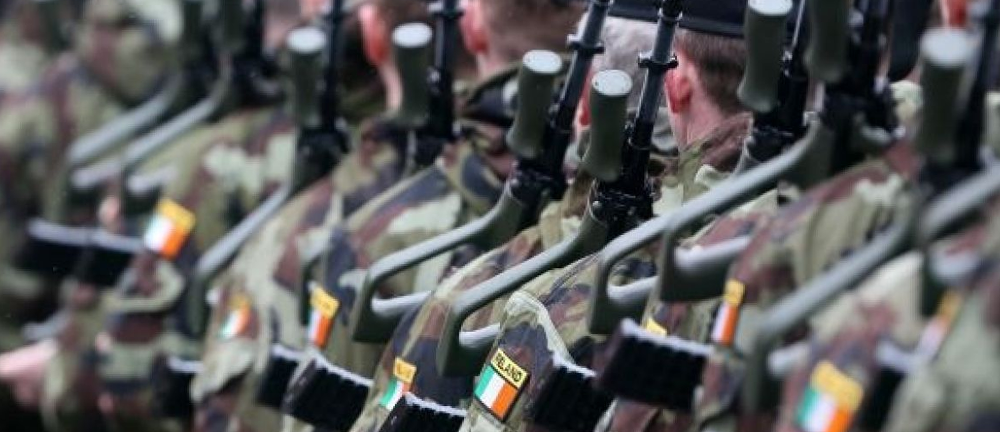Never miss the opportunities thrown up by a crisis to advance long-held goals! The Russian invasion of Ukraine has provided such an opportunity for the Irish establishment and the establishment media to push forward their long-held agenda to ditch Irish neutrality and to use the Ukrainian crisis to push for even greater military and political co-operation and co-ordination with the European Union.
Neutrality was in many ways a genuine desire not to get involved with the imperial powers but was also a legacy of the War of Independence and the role played by the British in the war against republicans in 1922–23. There was no stomach to back the British or to allow British forces back or to use any part of the 26-County state.
Irish neutrality has a long history and was a vital position of the more radical forces within the national independence movement, from Wolfe Tone in the 1790s to James Connolly and the Neutrality League of 1914. Even during the bleak 1930s and during the Second World War the 26-County state stayed out of the conflict.
Not alone did partition fracture our people, in particular the working class, with a significant section of the people divided by the imposed British border, but also the Six Counties remained within the British imperial military strategy and of critical strategic importance, given its relation to the North Atlantic. So part of the Irish people have been and still remain part of NATO.
The Irish establishment, particularly that section whose economic interests lay in retaining maximum economic relations and subservience to the needs of imperialism—Fine Gael—have always had a hostile attitude to neutrality. Both Fianna Fáil and the Labour Party have had an ambivalent attitude, using neutrality when it suited them but never fully embracing it. They never supported the demand for neutrality to be enshrined in the Constitution. Nor was there ever any attempt to join the Non-Aligned Movement but instead they studiously avoided having any relationship with it.
There was never any effort to establish anti-imperialist or even anti-colonial credentials by the political leadership of this state. Their economic subservience to imperialism was of primary importance to their own material interests.
There have been a number of important occasions when this state used its international standing. It played a central role in securing the support of the United Nations for the adoption of the Nuclear Non-Proliferation Treaty in July 1968. Because of his role in promoting non-proliferation during the period 1958–1961 the then minister for external affairs, Frank Aiken, was the first person to sign the treaty.
But since Ireland joined the European Economic Community in 1973 this position has been steadily eroded. During the campaigns for all the treaties promoted by the EEC (later EU) in its strategy of building a unified political, economic and military bloc the Irish establishment have consistently denied that our membership, or the adoption of this or that treaty, would have any effect on our neutrality.
That has clearly not been the case. The foreign policy of the 26-County state is in step with the European Union and its global imperialist strategy. With the adoption and support of PESCO this state has committed itself to benchmarking EU military spending requirements.
Under the “triple lock,” if the number of military personnel is greater than twelve an overseas operation has to have the support of the Government, the Dáil, and the United Nations; any smaller number does not need to be made public or put before the Dáil. That is why Irish military personnel were able to take part in the war and the occupation of Afghanistan, and why we were able to back up France in its recent military adventures in Mali and its other former colonies in Africa.
Over the course of the conflict in Ukraine there has been a consistent assault on what remains of the neutrality of this state. Some commentators and politicians, particularly from within Fine Gael, openly state that it should join NATO, wile the more realistic recognise that joining NATO would be a step too far for Irish people, but they see the main prize as pushing forward and securing maximum political and military co-operation or subservience within the EU. It would be NATO by the back door.
The leaders of both Fianna Fáil and Fine Gael have shown that they put the interests of the EU ahead of those of our people. They are involved in the EU military escalation strategy rather than developing a peace strategy to bring the Russians and Ukrainians together.
This state won a seat on the UN Security Council on the grounds that it was neutral and that it understood the issues raised by the global south as a former colony itself. Neutrality does not mean doing nothing but rather being active in the struggle for peace, in nuclear disarmament, in the struggle for global economic and social justice.
The Irish people support neutrality by a large majority. They also support the demand for boycott, disinvestment and sanctions against the Zionist state of Israel; yet the Government refuses to activate the Occupied Territories Act. Yet it has supported, and continues to support, either actively or passively, the imposing of sanctions on countries and individuals.
We need to be fighting for a progressive neutrality, which would include taking action on
- demilitarisation and de-escalation of the war in Ukraine
- global nuclear disarmament
- promoting the United Nations as the vehicle for negotiating an end to conflicts
- campaigning for global economic, social and environment justice
- promoting measures to challenge racism and all forms of discrimination.






